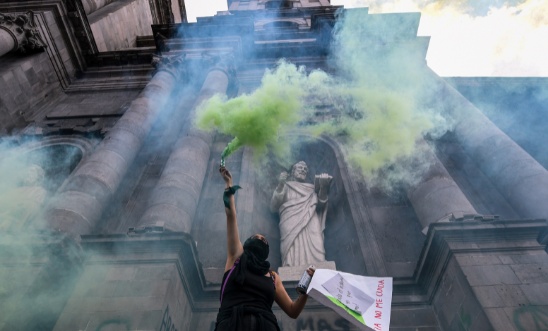
Press releases
Mexico: authorities failing victims of femicide as gender-based violence continues at a terrifying pace

Last year at least ten women were murdered every day in Mexico
Families of victims left to investigate murders due to significant police failings
‘The authorities did not help us to search, they did not help us arrest anyone, we did everything’ - Luz María Silva Sosa
‘Each femicide has an appalling impact on the victims’ families’ - Edith Olivares Ferreto
The shocking epidemic of disappearances and femicides in Mexico continue to go largely uninvestigated by the country’s authorities, hampering the judicial process and making it increasingly likely that perpetrators will remain unpunished, said Amnesty International in a new report released today.
Amnesty’s 47-page report – “Justice on trial: Failures in criminal investigations of feminicides preceded by disappearance in the State of Mexico” - documents four emblematic cases of femicide preceded by disappearance and significant failings by the authorities in the criminal investigations of each murder.
Last year alone 3,723 murders of women were registered in Mexico, of which 940 were investigated as femicides in the country’s 32 states – this equates to at least ten women being killed every day. Around a third of victims were killed for reasons relating to their gender.
The cases documented were those of:
- Nadia Muciño Márquez: Killed in 2004
- Daniela Sánchez Curiel: Disappeared in 2015. Whereabouts remain unknown and her family assumes she was a victim of femicide
- Diana Velázquez Florencio: Disappeared and was killed in 2017
- Julia Sosa Conde: Disappeared and killed in late 2018
The report reveals how the authorities’ investigations into femicides in Mexico are failing because evidence is lost, the level of investigation is inadequate, and there’s a lack of understanding on gender perspective.
In the case of Julia Sosa Conde, the authorities failed to thoroughly investigate her disappearance and murder. Luz María Silva Sosa, daughter of Julia Sosa Conde, a victim of femicide, said:
“It was us who found my mother. [The authorities] did not help us to search, they did not help us arrest anyone, we did everything.”
The report found that victims’ relatives – generally women – take the lead in investigations and use their own resources to do so. The authorities not only draw on families’ investigation efforts but have also attempted to normalise the situation where officers will sometimes wait for families to make progress before continuing with their own investigations.
Laura Curiel, mother of Daniela Sánchez Curiel, a victim of disappearance, said:
“An [official] on my case would ask me when I went there: ‘What have you got for me? What have you investigated for me? What do you know?’ And I would say to him: ‘Well, I come here so you can tell me what you have investigated, what you have, what you know’.”
In some instances, the authorities threaten and harass families so that they do not bring the case to the attention of their superiors. But they also face dangerous threats from perpetrators and do not receive protection from authorities.
María Antonia Márquez, mother of Nadia Muciño, said:
“The threats caused me a lot of stress. My weight went down to 40 kilos. I suffered from anxiety, a terrible level of stress.”
The report also shows that the State of Mexico Attorney General’s Office does not have the necessary framework to carry out such investigations: staff workload is already over capacity, and they lack the material resources to carry out a number of procedures.
Amnesty found that the failings documented in the investigation result in violations of women’s rights to life and physical safety and their families’ rights to judicial protection and access to justice.
Edith Olivares Ferreto, Executive Director of Amnesty International Mexico, said:
“Violence against women must be a high priority on the agenda of the federal and local governments. They must prevent, investigate, and punish femicides with due diligence.
“Each femicide has an appalling impact on the victims’ families, who, in their search for access to the truth, justice and reparation for the harm done, also suffer re-victimisation by the authorities.
“We will continue to raise our voices together with the victims’ families and support them in their search for truth, justice and reparation for the harm suffered, until they are heard.”
Women in Mexico: Campaigning for change
Amnesty has launched the #HastaSerEscuchadas (Until They Are Heard) campaign which aims to ensure that the authorities publicly acknowledge the failings in the investigations of femicides, comply with the movement’s recommendations and initiate a process to provide reparations for the harms caused by these failings.
To protect the rights of victims, Amnesty has also made the following recommendations:
- Mexico’s Attorney General’s Office: Ensure that the Central Attorney General’s Office on Crimes Linked to Gender-Based Violence has the resources to carry out its function efficiently and with decent working conditions, deliver training on how to investigate disappearances and killings of women from a gender perspective.
- Congress of Mexico: Ensure that the State of Mexico Attorney General’s Office, especially the Central Attorney General’s Office on Crimes Linked to Gender-Based Violence has the resources to carry out its functions properly.
- State of Mexico Human Rights Commission: Investigate the problem of failures in criminal investigations of crimes of violence against women, especially femicides and disappearances, and issue recommendations that address the issues highlighted in this report.
- To the Federal authorities: Publicly acknowledge the scale of the problem of femicides and disappearances in Mexico, as well as the failings in the investigations into these crimes.